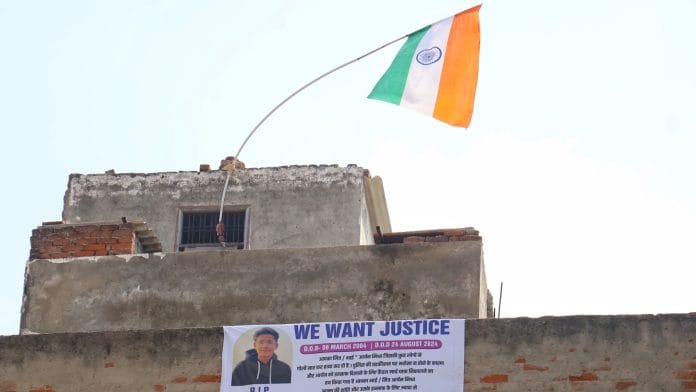The news of a migrant ragpicker from West Bengal being lynched by a mob and an elderly Muslim man assaulted on a train over suspicion of carrying beef hadn’t even faded from public memory or the news cycle when another tragedy surfaced. Nineteen-year-old Aryan Mishra, a Class 12 student from Faridabad, was murdered by cow vigilantes. He was suspected of being a cow smuggler.
The significance of cows in Indian political and religious history dates back long before the British colonial era. Even the Mughals are said to have banned the slaughtering of cows. And cow protection movements started establishing ‘Gaurakshini Sabhas’ in 1882. Though much has changed in India since those times, the emotional and cultural sentiments surrounding cows still remain deeply rooted.
What’s striking in the Faridabad case is that the accused cow vigilantes were acting to stop cow smuggling. It raises a fundamental question: why do civilians feel the need to act as protectors, taking the law into their own hands? What is even more concerning is that they lack any fear of the law or consequences. This is a clear sign that we can no longer turn a blind eye to the urgent need for systematic reforms in our policing.
It doesn’t matter which political party is in power, there seems to be a genuine lack of political will to introduce any meaningful police reform. A significant part of the problem is rooted in people’s distrust of the system’s ability to deliver justice. The state must first acknowledge that parallel forces are attempting to fill the gap, taking justice into their own hands because of ‘hurt sentiments’. But justice should remain the exclusive monopoly of the state and the state’s failure to keep it as such not only undermines the very foundation of law and order but also weakens its authority.
Also read: Faridabad gau rakshak now ‘regrets’ killing a Brahmin. ‘Sad we killed our brother’
Proclivity to violence
While the system’s failure to control such non-state actors must be addressed, it is equally important to discuss the dangerous ideas and beliefs that turn ordinary people into murderers. Some individuals believe that legal consequences are not enough punishment and that violence or even murder is justified to defend their religious sentiments.
They think there is a greater purpose behind all they do. This so-called “higher purpose” varies based on context—it can be honour, religion, or other deeply ingrained beliefs. However, they’re all used to justify violence.
An Indian Muslim killing someone over blasphemy, a Sikh reacting to beadbi (sacrilege), or Hindu cow vigilantes lynching someone are all driven by the same mindset.
There are fundamental differences between Abrahamic faiths and Indic faiths, especially Hinduism. From what I have learned, Hinduism is not as organised or structured as the Abrahamic religions. It’s more philosophy-driven and does not have a formal concept of blasphemy. The response to hurt sentiments thus comes from societal mores rooted in cultural identity and not a strict religious doctrine.
But it’s important to recognise that any community, regardless of its religious framework, is capable of slowly and systematically adopting harmful ideas. Human proclivity toward violence, intolerance and extremism exists beyond the boundaries of religion. Even in the absence of a formal doctrine like blasphemy, cultural and societal factors can fuel negative reactions and lead to the adoption of harmful ideologies.
Acceptance of cow vigilantes and the legitimacy of their violence seems to be heading in that direction. While Muslims are the main targets for such violence, the harsh reality is that anyone can be killed.
The cow vigilantes in Faridabad, who now express regret over killing a Brahmin reveal a troubling double standard—sorrow seems to hinge on the victim’s identity. Their statements make it sound as though the loss would have been more acceptable if the victim had been a Muslim. This perverse reasoning reveals a great deal about the mentality that is at work, which values some lives more than others. This murder is a chilling reminder that violence, once justified in the name of a cause, can easily spread its net to ensnare anyone in its path.
Amana Begam Ansari is a columnist and TV news panelist. She runs a weekly YouTube show called ‘India This Week by Amana and Khalid’. She tweets @Amana_Ansari. Views are personal.
(Edited by Theres Sudeep)







By reading writing name I know what she is gonna to write. Nevertheless, beef sale is ban so why are you desperate to consume??
Not only this they are knowingly through beef in holy place of Hindu. What can you infer from this? Yes, I’m totally against killing people against name of saving cow but how you compare with blasphemy? Hindu are not narrow minded as Muslims. Mostly 80 percentage don’t support this type of carp.
Absolutely, Hindutva is nothing but an attempt at Islamisation of Hinduism by bringing in all the bad elements from it like blasphemy laws (Hindus now take offense for everything) aposatasy laws (Hindus have anti conversion laws ), instutionalization of fear (Cow vigilantism, Censoring of any content that is critical) etc. Dont know when the right senses will prevail
They are not alike. They were never alike and they will never be alike.
An overwhelming majority of Hindus do not support such crimes in the name of gauraksha.
However, Islamic society in general supports “sar tan se juda” for blasphemy accused.
Therein lies the difference.
Gaurakshaks crossing the line in India, more often than not, are arrested and prosecuted. Unfortunately, blasphemy murderers are celebrated and cherished. An example is the murderer of Salman Taseer – governor of Pakistani Punjab province. He has been elevated to the status of a Ghazi and his grave is a “sacred” shrine for Muslims.